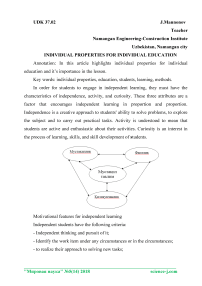Individual properties for individual education
Автор: Mannonov J.
Журнал: Мировая наука @science-j
Рубрика: Основной раздел
Статья в выпуске: 5 (14), 2018 года.
Бесплатный доступ
In this article highlights individual properties for individual education and it’s importance in the lesson.
Individual properties, education, students, learning, methods
Короткий адрес: https://sciup.org/140263628
IDR: 140263628
Текст научной статьи Individual properties for individual education
In order for students to engage in independent learning, they must have the characteristics of independence, activity, and curiosity. These three attributes are a factor that encourages independent learning in proportion and proportion. Independence is a creative approach to students' ability to solve problems, to explore the subject and to carry out practical tasks. Activity is understood to mean that students are active and enthusiastic about their activities. Curiosity is an interest in the process of learning, skills, and skill development of s tudents.
Motivational features for independent learning
Independent students have the following criteria:
-
- Independent thinking and pursuit of it;
-
- Identify the work item under any circumstances or in the circumstances;
-
- to realize their approach to solving new tasks;
-
- not only to understand and learn the knowledge to be learned, but also to find quick, effective ways to master this knowledge, skills and skills;
-
- Critical approach to analysis of work performed;
-
- freedom of their ideas and decisions.
Future vocational education teachers should have the strength to succeed so as to maximize their knowledge and skills, so that they can achieve high levels of professional practice.
As you know, students should be able to create creative relationships in their learning process and master the materials at a high level.
The desire for this is insufficient, although today there are sufficient teaching and methodological materials, textbooks and manuals. The pupil scientist V.P.Bespalko draws attention to this question by saying, "If textbooks are inseparable from discipline, students should not be taught to independently formulate their own worldview, but if they do not have the educational goals of creating creative qualities of students, it is not advisable to develop skills, and it is unlikely that students will master the material at a high level. i, "[1].
The correct solution will depend on the age and personality of the students, as well as on the specific personality, spirituality, pedagogical, professional and personal qualities of the students. Conscious students' conscious independence is shaped by the motives - motivation - interest - the active consciousness - the way in which the knowledge, skills and abilities needed are needed.
The development of the need for independent learning motivates the subject to the active, and at the same time sets the task of gaining knowledge and skills. The question of how to get independent knowledge can be summarized as follows: Unlike the predefined teaching process, the outcome of the teacher and student collaborator should be that the subject is uncertain and unplanned in obtaining independent knowledge - that is, the exact amount of knowledge, skills and skill need.
Students can independently learn knowledge independently of the principle of self-learning (autodynamics - self-learning and autonomy) and the need for selfexpression in the pyramid of human needs [3].
Autodidactics is the organization of regular, independent and autonomous activities in accordance with the objective of the educational process to develop knowledge, develop imaginations, build concepts, skills and skills. It was emphasized that such concepts as "independent learning", "self-discipline" and "independent study", which are important elements of the autodidactic principle, serve to formulate consistently, continuously, independently and individually.
Independent learning technology and the need for independent learning relate to one another: Frustration with realistic results can cause the student to get independent knowledge. Creating an independent learning technology involves solving some of the specific issues. The most important of these is to determine the purpose of independent learning. As a factor that demonstrates the ability of future vocational education teachers to learn independently and creatively, they can:
-
- To create independent learning skills and skills by independently acquiring new knowledge from various sources;
-
- Use knowledge gained from the supplementary literature, skills gained and skillfulness in the learning process;
-
- Being able to use the knowledge gained in practice in the classroom and in life.
If a student is required to perform tasks unexpectedly, he or she may not be able to complete the assignments. As a result, students lose confidence in their strength. In order to avoid such a situation, it is important to first assign tasks in such a way that the subject independently performs only part of the assignment, and then together with the teacher, analyze the results correctly.
In the course of the homework, students are expected to be motivated by the role of organizational (value-oriented learning activities, knowledge, skills, qualifications), meaningful (procedural) knowledge of the essence of learning activities and the development of personal qualities that determine success the ability to evaluate the characteristics of the particular person) formation occurs in the complex formation of independent knowledge.
Список литературы Individual properties for individual education
- Беспалько В.П. Педагогика и прогрессивные технологии обучения. - М.: ИРПО, 1995.
- Матчанов С. Умумтаълим тизимида адабиётдан мустақил ишларни ташкил этиш: Автореф. дис. … пед.фан.докт. - Т.:1998.
- Қўйсинов О.А. Касб таълими йўналиши бакалавр ўқитувчиларни тайёрлашда мустақил таълимнинг илмий - методик асослари. Дис. … пед. фан. ном. - Т.: 2008


